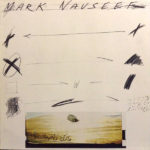
Is it jazz? That’s a repetitive refrain that I’ve been proposing lately to this blog. Native New Yorker, Mark Nauseef’s Wun-Wun is classified under the jazz moniker but it doesn’t sound remotely like it. It all begins with percussive motifs that speak of improv and “free” ideas but settle into Pan-Pacific movements that require very personal, immediate expression, expressing this back to the listener — you get the ideas behind Mark’s work…even if you’re not entirely sure where they’re coming from.
Mark’s bio in a short, concise form can be summed up as “Johnny come lately.” Spurning a career in auto-mechanics, Mark took inspiration from his New York-Lebanese family’s roots in percussion and pursued music instead. A percussionist and drummer, Mark’s personal biography highlights early stints in Europe with bands like Dio’s Elf, Rainbow, Thin Lizzy, and Doug Yule-led The Velvet Underground, bands that sound entirely alien to what you’ll hear on Wun-Wun.
For a brief moment in his life, it appeared staying in the rock field would be his destiny. However, various failed stints with rock bands and (likely) creative nadirs inherent in such styles led him to chase something else and re-educate himself in ways that would be more fruitful. Deciding to strike out in exploratory work referencing his study in Indian, Asian, and African music, he signed to Germany’s shifty-style independent jazz label, CMP Records and record the first of his many early albums in Germany. Undeterred by the change in focus, Mark would enlist none other than musicians like Phil Lynott, Jan Akkerman, Joachim Kühn, and Trilok Gurtu (the latter two known to straddle the line between world music and jazz) to help him on his debut.
Although 1981’s Personal Note would establish for Mark a foothold in the jazz world, it’s more frantic, showy, sound would be less lasting. Fusion wasn’t exactly what he was after. Two years later on in Sura, experimenting with more esoteric, floating music, Mark (with the help of Markus Stockhausen, Herbert Försch, and David Torn) found himself creating music more in league with the unclassifiable “fourth world” bent younger jazz musicians were exploring. Using traditional percussion and an assortment of “created” instruments, Mark’s solo work was becoming increasingly less easy to pigeonhole as belonging to any genre.
Sura, therefore, I think, is the perfect entry point for Mark’s quite interesting textural percussion compositions. So, then, why is the focus on Wun-Wun today? Because of the truly brilliant, outside the box contributions from one wayward ex-Blind Faith/Cream vocalist/bassist: the late, great Jack Bruce.
If you ever have a chance to check out Jack’s early ‘80s solo work, Automatic and collabs with American jazz vocalist Kip Hanrahan, you’ll notice that Jack had shaken off his drug habit and taken in a love of world music. Bringing in his left field ideas on phrasing into Mark’s previously all-instrumental mix transforms music that could lean into formless jams, towards something else. The addition of violinist Walter Quintus and Trilok Gurtu carrying over his fascinating work from the prior album would help, too.
Leaning heavily into eastern microtonal singing, songs like “Colotomix” and “Jones” make good use of their runtime to let Jack float in all sorts of gorgeous melismatic singing. Don’t know if Jack was into Nana Vasconcelos but an obvious nod to the vocalese of Brazilian South America can be heard throughout this record.
In the end, though, the person who brings out the most interesting ideas is Mark himself. Shifting tempos, song structures and whole melodies in songs stretched out to seriously long timestamps, one would think the songs would fall on the wrong side of meandering. There’s just something quite moving about songs that are full of all these kind of sonic movement.
“Jones” takes the cake for a track that belongs heard by far more than could have discovered this hidden gem, tucked inside some upstart, forgotten, German jazz label. It’s hard to make out what to say about a piece that uses reverse-playback marimba to such an extent that it prefigures something passionately spiritual that you can quite achieve with it solely. Dedicated to Mark’s young son, it sounds like a lullaby from some otherworldly place than our own place in the sun. Heck, I’ll end it there and say: “apply that to the rest of the album and you’ll get the idea”.
